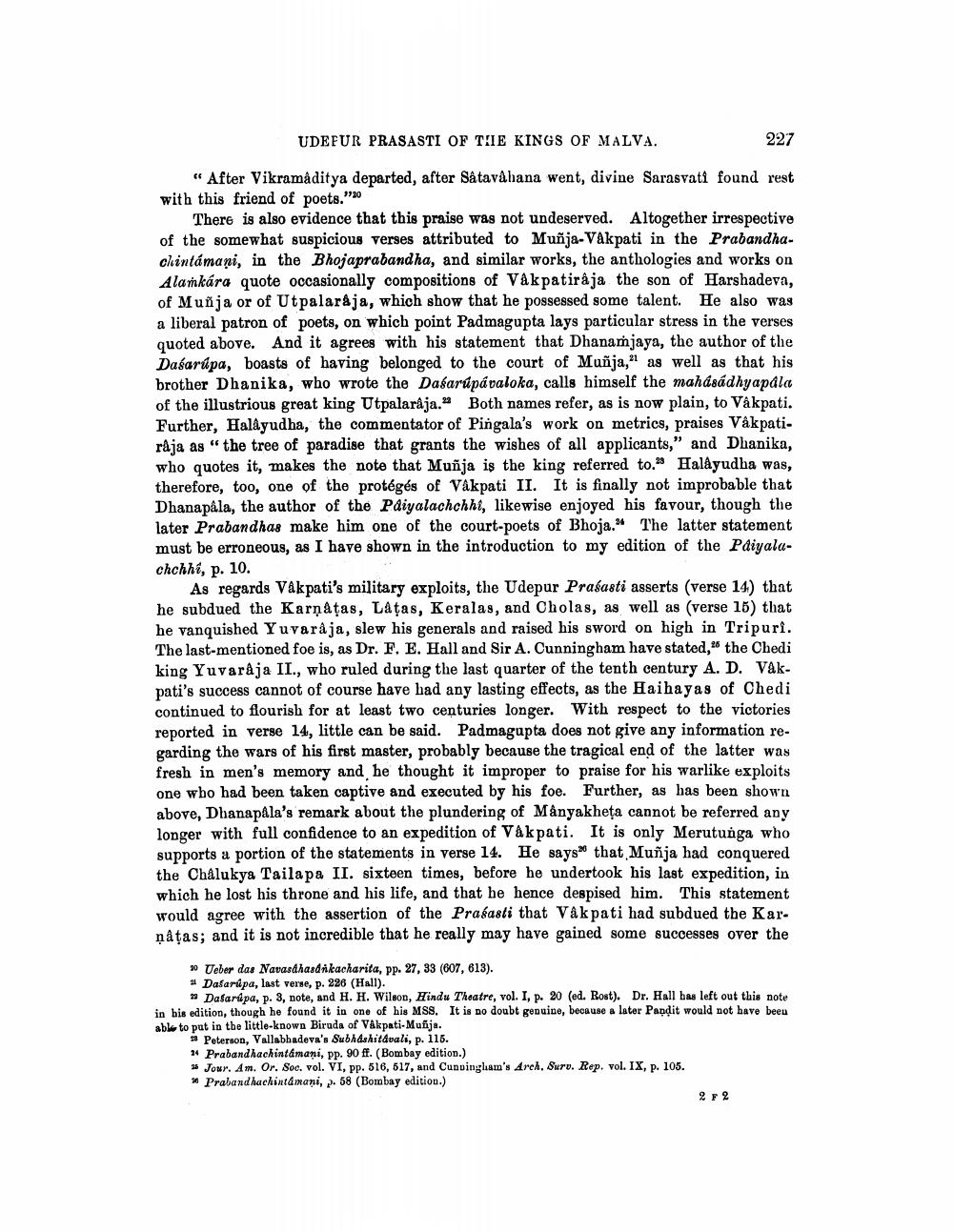________________
UDEFUR PRASASTI OF THIE KINGS OF MALVA.
227
"After Vikramaditya departed, after Satavahana went, divine Sarasvati found rest with this friend of poets."20
There is also evidence that this praise was not undeserved. Altogether irrespective of the somewhat suspicious verses attributed to Muñja-Vakpati in the Prabandhachintamani, in the Bhojaprabandha, and similar works, the anthologies and works on Alankára quote occasionally compositions of Våkpatiraja the son of Harshadeva, of Muñja or of Utpalaraja, which show that he possessed some talent. He also was a liberal patron of poets, on which point Padmagupta lays particular stress in the verses quoted above. And it agrees with his statement that Dhanamjaya, the author of the Dasarúpa, boasts of having belonged to the court of Muñja, as well as that his brother Dhanika, who wrote the Datarúpávaloka, calls himself the mahdsádhyapala of the illustrious great king Utpalaraja. Both names refer, as is now plain, to Vakpati. Further, Halayudha, the commentator of Pingala's work on metrics, praises Våkpatirája as "the tree of paradise that grants the wishes of all applicants," and Dhanika, who quotes it, makes the note that Muñja is the king referred to." Halayudha was, therefore, too, one of the protégés of Vakpati II. It is finally not improbable that Dhanapala, the author of the Pdiyalachchhi, likewise enjoyed his favour, though the later Prabandhas make him one of the court-poets of Bhoja." The latter statement must be erroneous, as I have shown in the introduction to my edition of the Pdiyalachchhi, p. 10.
As regards Vakpati's military exploits, the Udepur Prasasti asserts (verse 14) that he subdued the Karnatas, Latas, Keralas, and Cholas, as well as (verse 16) that he vanquished Yuvarája, slew his generals and raised his sword on high in Tripuri. The last-mentioned foe is, as Dr. F. E. Hall and Sir A. Cunningham have stated, the Chedi king Yuvarája II., who ruled during the last quarter of the tenth century A. D. Vakpati's success cannot of course have bad any lasting effects, as the Haihayas of Chedi continued to flourish for at least two centuries longer. With respect to the victories reported in verse 14, little can be said. Padmagupta does not give any information regarding the wars of his first master, probably because the tragical end of the latter was fresh in men's memory and he thought it improper to praise for his warlike exploits one who had been taken captive and executed by his foe. Further, as has been shown above, Dhanapala's remark about the plundering of Månyakheta cannot be referred any longer with full confidence to an expedition of V&k pati. It is only Merutunga who supports a portion of the statements in verse 14. He says that Muñja had conquered the Chalukya Tailapa II. sixteen times, before he undertook his last expedition, in which he lost his throne and his life, and that he hence despised him. This statement would agree with the assertion of the Praéasti that Vák pati had subdued the Kar. natas; and it is not incredible that he really may have gained some successes over the
» Ueber das Navasáhasdikacharita, pp. 27, 33 (607, 613).
Dasarpa, last verse, p. 226 (Hall).
* Dasarépa, p. 3, note, and H. H. Wilson, Hindu Theatre, vol. I, p. 20 (ed. Rost). Dr. Hall has left out this note in his edition, though he found it in one of his MSS. It is no doubt genuine, because a later Pandit would not have beeu able to put in the little-known Biruda of Vakpati-Mufija.
» Peterson, Vallabhadeva's Subhashitavali, p. 115. ** Prabandhachintamani, pp. 90 ff. (Bombay edition.) » Jour. Am. Or. Soc. vol. VI, pp. 516, 517, and Cunvinglam's Areh, Suru. Rep. vol. IX, p. 105. * Prabandhachintamani, p. 58 (Bombay edition.)
2 F 2




